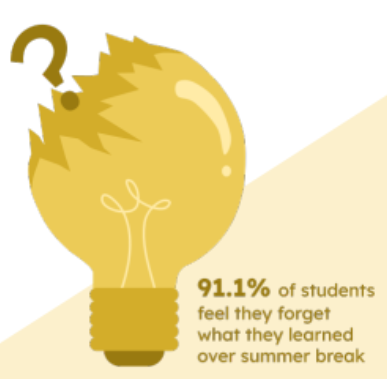When one thinks of a “summer slide”, a multicolored slip n’ slide or twisting waterpark attraction might come to mind, yet the reality for high school students is much less enjoyable. The term “summer slide” refers to the learning loss that often occurs over the summer. While students are not actively learning, they often forget the knowledge they gained over the last school year. This causes them to “slide” backward in their academic progress during the next year. A nationwide survey found that only 31.3% of teachers believe their students retain what they learned the previous year upon returning to school in the fall, according to Progress Learning. This is because students tend to forget or lose progress when they go without actively learning for too long. The issue is particularly heightened at schools like Communications High School (CHS) that offer block scheduling.
Due to the scheduling, students can go without being in certain classes for over a year, explains Junior Honora Griffiths of Red Bank.
“When not having math or not having Spanish for a semester, I definitely forget a lot of core concepts,” Griffiths said. “You just have to memorize so many new things for the next semester, it feels inevitable that you will let go of what you don’t need in that moment.”
Griffiths suggests that reviewing previously learned information at the beginning of the school year or semester can be helpful, especially in certain classes.
“Over the summer, you definitely lose the academic mindset, so it can be hard to get right back in,” said Griffiths. “A review could be helpful to ease the transition.”
Junior Kamila Lopez of Long Branch feels that the beginning of the school year is often less daunting than it may seem on the first day.
“It’s kind of hard to remember,” Lopez said. “But it comes back after a day or so.”
Working on academic skills during time off from school can minimize learning loss in certain areas. A study conducted by researcher Thomas G. White and Harvard professor James S. Kim concludes that the diverse range of students’ loss in comprehension during school breaks can be attributed to unequal access to educational opportunities.
“One longitudinal study showed that more than half of the gap in 9th-grade reading comprehension scores was explained by differences in summer learning that accumulated from 1st to 5th grade,” the study claims.
This is why many schools may opt to give students summer homework, it can both prevent a summer slide and prepare students for the year ahead.
“You cram so much information into your mind in such a short period of time that once you don’t need it your mind just lets it go,” Griffiths said.











